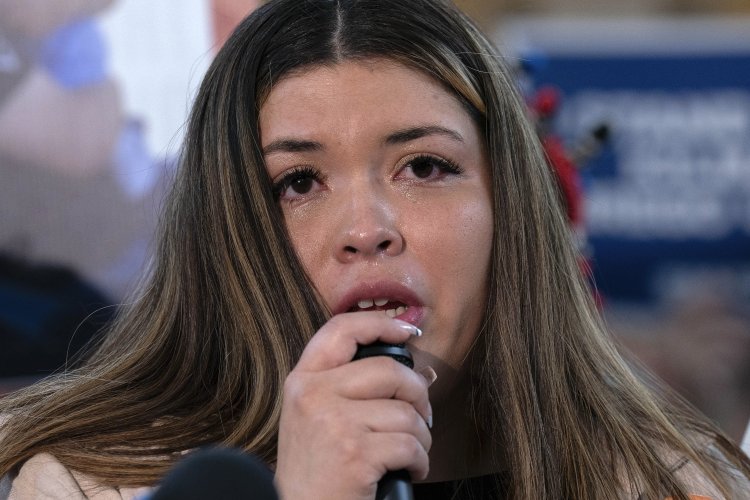Judge upholds decision to bring back Maryland man wrongly deported to El Salvador
She dismissed the notion that the Trump administration lacks the authority to return the deportee.

U.S. District Judge Paula Xinis dismissed the Trump administration's request to retract her order from Friday, which mandates the return of Kilmar Abrego Garcia by Monday night. The Justice Department argued that the court had no authority to make such a decision and was interfering with President Donald Trump’s exclusive power over foreign policy.
Xinis characterized the wrongful deportation of Abrego Garcia—who was under a 2019 court order prohibiting his removal to El Salvador due to fears of retribution from a violent gang—as a "grievous error" that necessitates his return.
"Defendants seized Abrego Garcia without any lawful authority; held him in three separate domestic detention centers without legal basis; failed to present him to any immigration judge or officer; and forcibly transported him to El Salvador in direct contravention of [immigration law]," Xinis stated in a 22-page opinion released shortly after 1 a.m. on Sunday. "Once there, U.S. officials secured his detention in a facility that, by design, deprives its detainees of adequate food, water, and shelter, fosters routine violence; and places him with his persecutors."
Abrego Garcia’s situation has sparked significant backlash from the courts, congressional Democrats, and has even caused turmoil within the Justice Department, where Attorney General Pam Bondi placed the attorney who represented the government in front of Xinis on leave. That attorney, Erez Reuveni, expressed frustration over the Justice Department’s lack of willingness to provide more information to the court or take necessary actions to facilitate Abrego Garcia's return.
The details surrounding Abrego Garcia's case are complex. The Salvadoran national, who has resided in the United States since 2012, was labeled a danger in 2019 due to an alleged connection with the MS-13 gang and was detained for several months. However, a judge ultimately ruled that he faced credible fear of persecution from another gang, Barrio 18, which had been extorting his family.
Following this ruling, Abrego Garcia was released in the U.S. where he lived with his wife and son, both U.S. citizens, until immigration officials unexpectedly detained and deported him last month. He has consistently denied any affiliation with MS-13.
Last week, the Justice Department acknowledged that it mistakenly returned Abrego Garcia to El Salvador, contrary to the 2019 court order, although officials maintained they still consider him to be a dangerous MS-13 member.
In her opinion, Xinis noted that the Justice Department provided "no evidence" supporting the claim that Abrego Garcia is affiliated with MS-13, effectively conceding this point in her court. However, by publicly categorizing him as a gang member, she pointed out that it places him in heightened danger in a Salvadoran prison that "intentionally mixes rival gang members."
Furthermore, the judge dismissed the administration's assertion that it lacked the authority to seek Abrego Garcia's return due to his custody in El Salvador. Instead, she suggested that the U.S. has essentially outsourced detention responsibilities to El Salvador while still retaining some ability to request the return of individuals they have transferred.
"Surely, Defendants do not mean to suggest that they have wholesale erased the substantive and procedural protections of [federal immigration law in one fell swoop by dropping those individuals in CECOT without recourse," Xinis noted, referencing the Salvadoran prison.
Notably, Xinis highlighted that Homeland Security Secretary Krisi Noem, who recently visited the facility, referred to it as "one of the tools in our toolkit that we will use."
"Thus, just as in any other contract facility, Defendants can and do maintain the power to secure and transport their detainees, Abrego Garcia included," Xinis reiterated.
Appearing on "Fox News Sunday," Bondi claimed that Abrego Garcia is associated with MS-13; however, Xinis said no proof had been presented to her.
"We have to rely on what ICE says. We have to rely on what Homeland Security says," Bondi stated, while dismissing the argument from Abrego Garcia's attorney that he was living a quiet life in Maryland studying to be an electrician.
Bondi also confirmed that Reuveni was put on administrative leave on Saturday.
“He did not argue,” the attorney general remarked, though Reuveni had argued that Xinis lacked jurisdiction to hear the case. “He shouldn't have taken the case. He shouldn’t have argued it, if that's what he was going to do,” Bondi opined. “You have to vigorously argue on behalf of your client.”
The Justice Department has appealed Xinis’ order to the Richmond, Virginia-based 4th Circuit Court of Appeals. On Saturday, the Trump administration requested an emergency stay of her order. As of Sunday morning, the appeals court had not responded to that request or established a timeline for Abrego Garcia’s legal team to respond.
Emily Johnson for TROIB News












